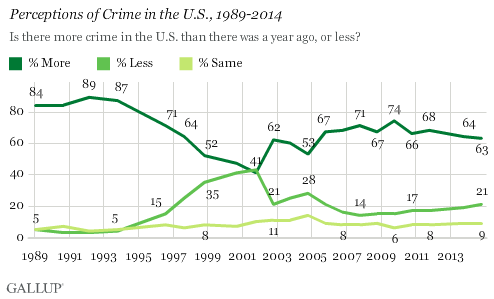Thanks to our media, the perception of increasing violent crime seems to be shared by the majority of Americans, a view strongly at odds with the reality of both the national and global stage. An annual Gallup poll asking Americans if they viewed crime as increasing, decreasing or staying the same seems to indicate a rising perception of crime increasing from 2002 and on, despite the fact that violent victimization rates have dropped from 80 people per 100,000 in 1993 to 23 in 100,000 in 2013, a rate almost a quarter of its 2013 value. Interestingly enough, perceptions of crime increasing locally have dropped slightly since the previous polling year (2012) but have remained within the mean since 1972, pointing at non-local new sources skewing our opinions of violent crime within the past 15 years.
This
shouldn’t be particularly surprising to anyone, there exists few better ways to
sell a headline than to make someone feel their individual safety or way of
life is in peril. Ebola is an interesting example of this phenomena, bearing a
host of symptoms like bleeding into the skin and gums, multiple organ failure
and decreased blood clotting. Few things are as viscerally abhorrent as a death
from such a horrific virus. Yet lower respiratory
infections, malaria and diarrheal diseases making up the largest chunk of
microbial deaths in the African continent. You have to give some serious credit
to the Bill and Melinda Gates Foundation for their development of the Omniproccessor ,
a machine that turns liquid waste into electricity and drinking water, and the
tremendous effect to diminish malaria related deaths through the foundation.
These massive killers, much more serious threats to impoverished citizens in
Africa, have no bearing on the quality of our lives and no perceived risk of
causing harm to the average citizen of the developed world. Malaria isn’t some
boogeyman that causes uncontrolled bleeding and a violent, gory death, it’s an
uncomfortable and tired demise.
This coupling of news with
entertainment leads to a disconnect between how viewers see the world and how
it actually is, with “sexier” topics taking the bulk of news coverage. News
providers need to cover their expenses, and greater viewership means more ad
revenue. This has the unfortunate consequence of shifting more ill-advised
viewers to a view of the world that is much more violent, angry, and fitting of
a dualistic good vs. evil motif than it actually is. The viewpoint is echoed by a Dr. Mark Warr, a sociologist at UT Austin:
“ “Many people don’t realize that while reported crime may
appear to go up in a given year, that doesn’t mean real crime rates are on the
rise,” Warr says. “Based on data from a variety of measurement tools, the
overall trend is actually quite good. In fact, the homicide rate in the western
world has actually been declining for more than 700 years.”
Yet when dramas such as “CSI,” “Criminal Minds”
and “Law & Order” dominate popular television, and crime coverage often
fills a quarter of newspapers, measured perspectives such as Warr’s are often
lost in the clamor for lurid stories about America’s most wanted.
As a result, the messages about crime that people receive from the
mass media are often out of sync with reality, Warr contends.
“People are bombarded with information about crime from the media,
which makes them believe the world is a much more dangerous place than it
really is,” Warr says. “This creates a climate of fear that can negatively
affect the way we live, the way we go to work, the times we shop and the
precautions we take for our families and children.” ”
The
effects such views can have on Public Policy formation should be strongly
considered by the public at large. The relative risk violent crime contributes to our everyday experience, or even our lives as a whole, is minimal. With so many other major causes of death like Diarrhoeal disease (death being preventable by simply hydrating affected individuals during the duration of their illness) and motor accidents still making the top ten list of killers globally, policy should be pushed much further in those directions if human mortality is really the goal driving policy.

I agree with some of this. I definitely do thinks that news media is becoming more and more polarizing and focused on "entertainment". However, how much of this increase in the perception of crime is simply caused by the rise of the Internet? We see the perception of crime beginning to increase from 2002 onwards, right when Internet use was becoming widespread. I think the media has always had some an agenda, to sell more stories and make more money. I think a larger factor in why people think crime is increasing is because the Internet has made news immediately available for anyone around the world.
ReplyDeleteFurthermore, I also think that one of the main factors behind how the media chooses stories is how relevant the story is to the audience. I certainly think it is problematic that, for example, 1000 people being killed by Boko Haram in Nigeria gets very little attention while a story about a school shooting is in the news for months. However, I think that people in the US are simply more interested in stories that affect them directly, and the media caters to these interests.